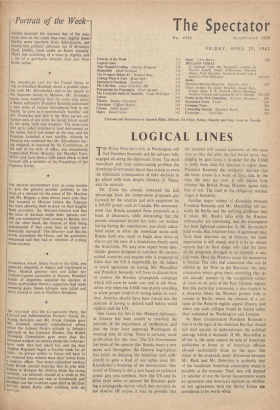—Portrait of the Week— EASTER BROUGHT the warmest day of
the year, more cars on the roads than ever, slightly, fewer deaths, more marchers from Aldermaston, and twenty-nine political prisoners out of Mountjoy Gaol, Dublin, freed under an Easter amnesty. There was something of a truce in Algeria, and a bit of a gun-battle between East and West Berlin police.
MR. MACMILLAN LEFT for the United States, to talk to President Kennedy about a possible meet- ing with Mr. Khrushchev, and in his speech to the Supreme Soviet in Moscow, Mr. Gromyko spoke more hopefully than for some time about a Berlin settlement. President Kennedy authorised a new series of nuclear atmospheric- tests in the Pacific 'as soon as is operationally feasible,' and Mr. Gromyko said that if the West carried out further tests of any kind, the Soviet Union would dc the same, 'with new weapons.' The Americans sent up a rocket intended to land instruments on the moon, but it lost power on the way, and the Russians launched a new satellite. Nobody in Moscow was surprised that Mr. Khrushchev hav- ing resigned, as required by the Constitution, at the end of his term of office, was immediately reappointed Prime Minister, but Marshal Voro- shilov may have been a little taken aback to find himself still a member of the Praesidium of the Supreme Soviet.
THE BRITISH GOVERNMENT went to some trouble to give the greatest possible publicity to the issue of a warrant for the arrest of Mr. Maclean and Mr. Burgess, a mere eleven years after they had levanted to Moscow (where the Treasury has been allowing them to draw on their English bank accounts): the Attorney-General said that the issue of warrants might deter 'persons out- side our jurisdiction' from coming to Britain, but 'on the other hand, the chances of their being apprehended if they come here in transit are Materially increased.' The Observer said that his words astonished the House, and the gentlemen concerned said they had no intention of coming home anyway.
*
EX-GENERAL SALAN, titular head of the OAS, was captured, disguised, in Algiers and imprisoned in Paris. Masked gunmen shot and killed two Turkish-Cypriot journalists in Nicosia. President Guido of Argentina annulled the election in Which ex-President Peron's supporters had made sweeping gains. Seven Africans were killed and seven injured in riots in Northern Rhodesia.
, * THE SCOTTISH -roc, the Co-operative Party, the Clerical and Administrative Workers' Union, the Young Socialists and Mr., Frank Cousins gave Mr. Gaitskell mutually contradictory advice about the Labour Party's attitude to Britain's approach to the Common Market. The British Transport Commission gave more than five thousand workers on railway docks the forty-two- hour week they had asked for, and the East Anglian Regiment began a five-day week for all ranks: no private soldier in future will have to do weekend duty without three days' notice from a superior officer. Two dozen redundant workers from British aircraft factories flew to jobs with Fokker in Holland. Mr. Stirling Moss, the racing motorist, was seriously injured in a crash in the international motor-car race at Goodwood, and his sister and her co-driver came third in the East African Safari Rally, after colliding with an antelope.














































 Previous page
Previous page